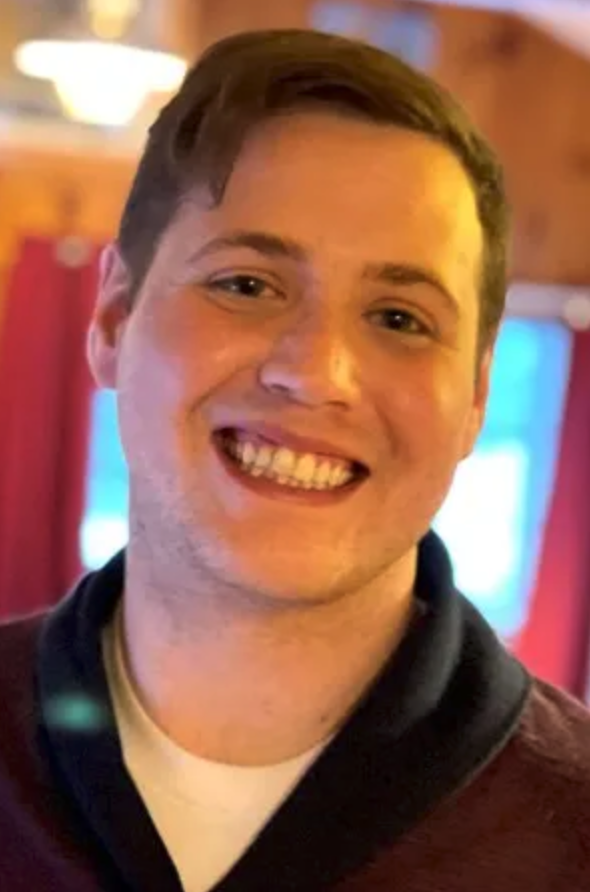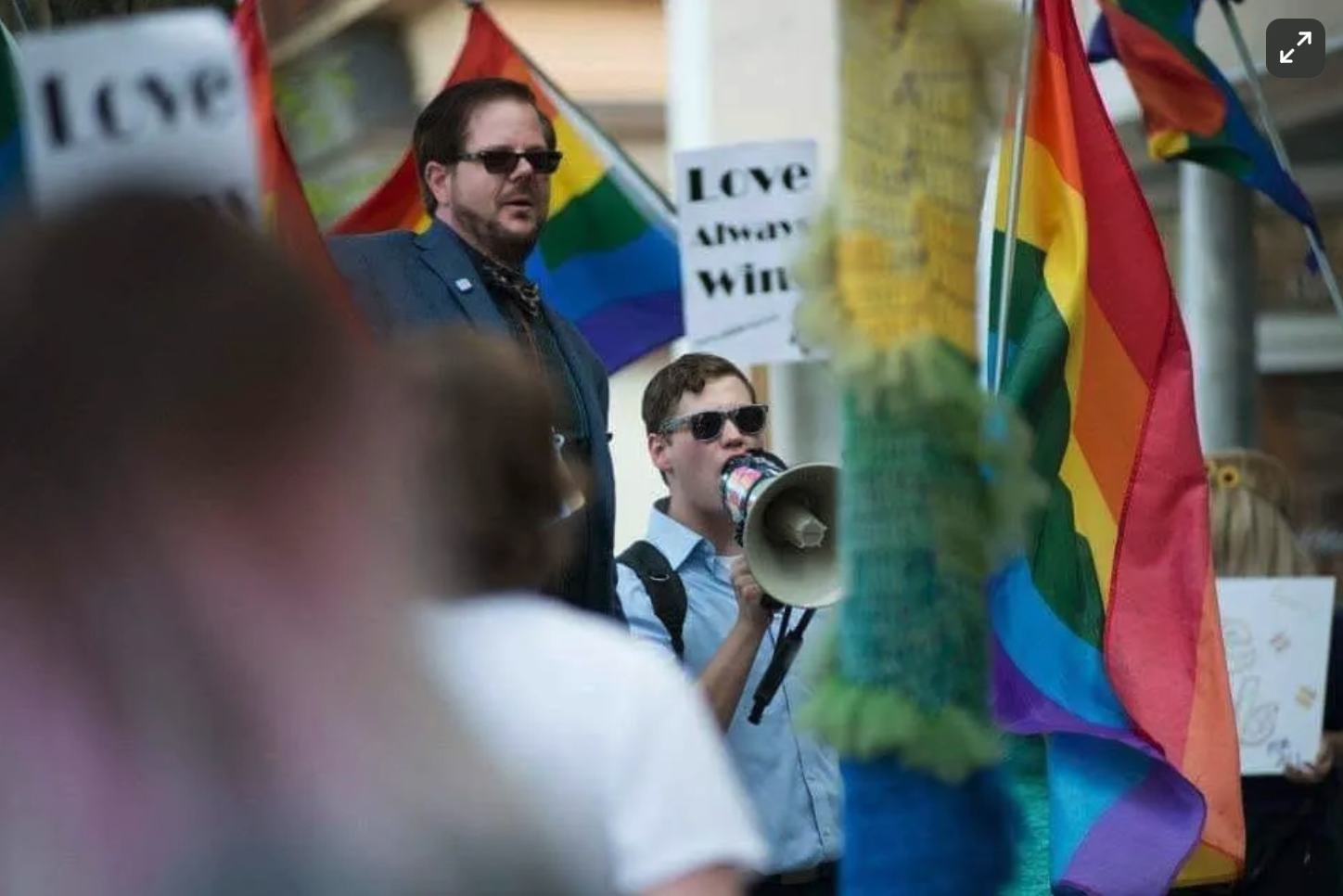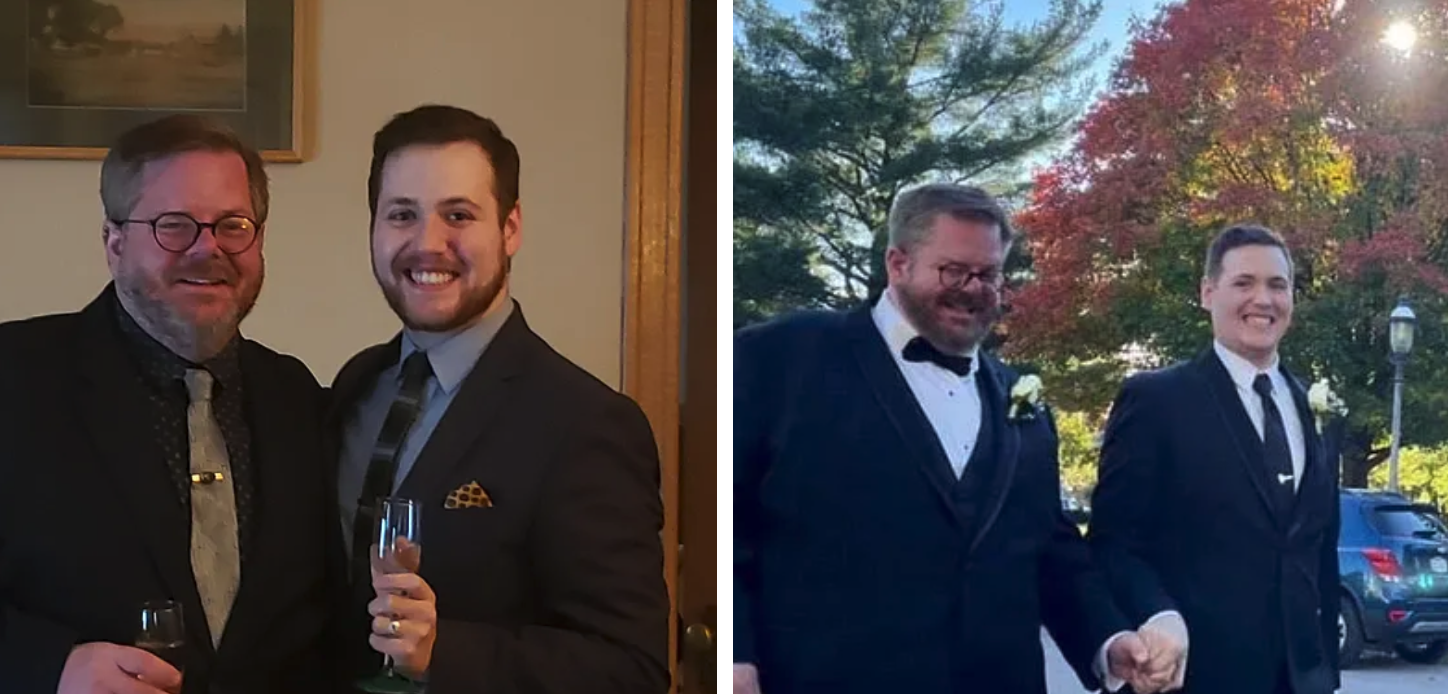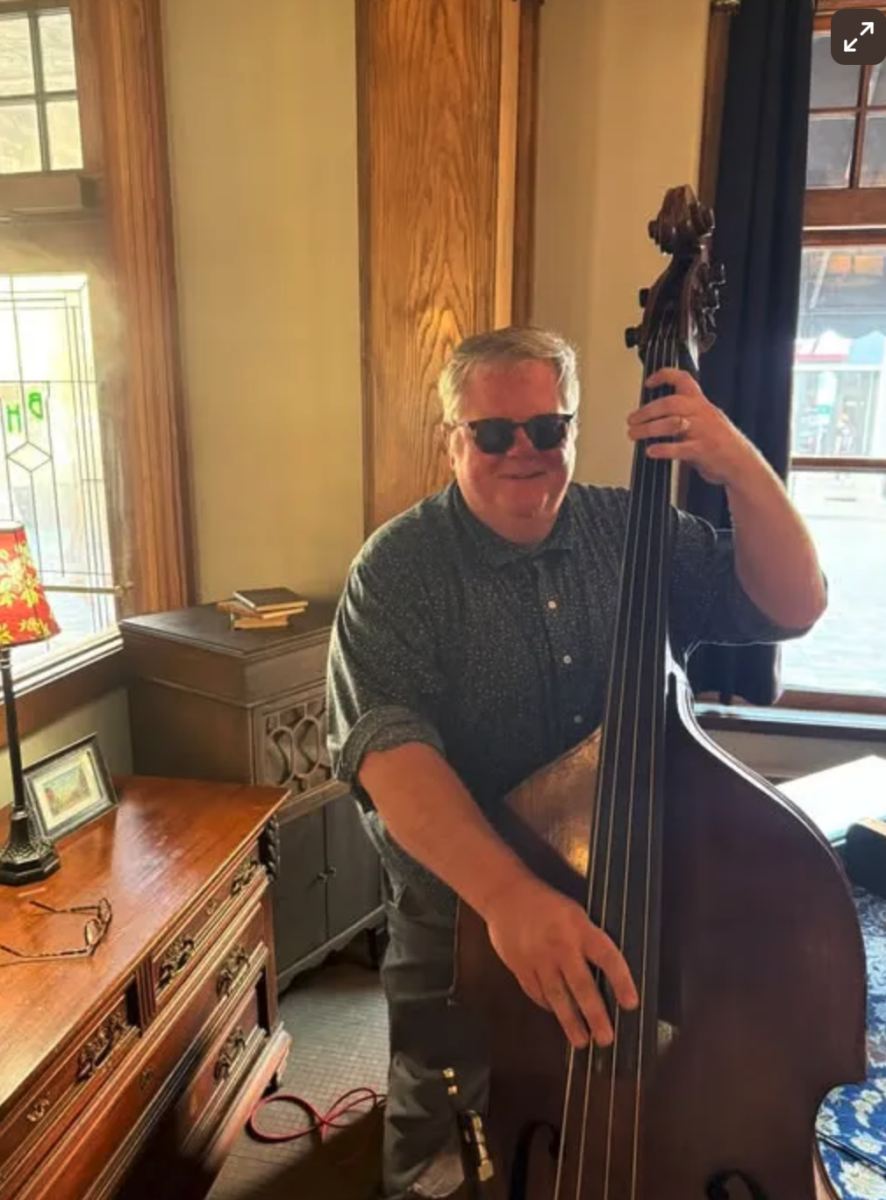An Iowa elected official serving with pride
Posted
by Pat Kinney
on Friday, June 13, 2025

Black Hawk County Supervisor Chris Schwartz (Pat Kinney photo)
WATERLOO — It has never been easy for Chris Schwartz to be “out there.” But he is, and to borrow a phrase from a Tom Petty song, he won’t back down.
Even when it hurts.
Schwartz made a daring decision many years ago. Some might have even considered it risky and unwise.
It was a decision many can’t do, nor have the opportunity or, frankly, the courage to do.
He decided to be himself. In his private and public life.
He was called to political activism. He also decided to seek elected office.
In doing that, he decided he was going to be public about what he believed, where he stood — and who he loved.
In 2016, Schwartz, a native of Dubuque, a graduate of the University of Northern Iowa and a longtime political activist with Americans for Democratic action, became the first openly gay individual to hold elected office in Black Hawk County. He won a seat on the Board of Supervisors.
He has been re-elected twice since then — most recently last fall — and is in his third term on the county board. And he’s taken his turns as board chair.
Being fully outed as gay and in a public position is still a bit of a gantlet, even in his ninth year in public office.
”It wasn’t always easy, and it’s still not always easy, because you become a target and there’s lots of eyes on you,” he said. “It’s definitely still a scary thing. All of a sudden you’re making yourself the most visible queer person in your community.”
Part and parcel of his political activism was Logun Buckley, his political ally and partner in life. They were wed in 2020.

Logun Buckley (obituary photo)
And when he lost Logun in December 2021, he decided was going to be open about that too — not just the loss, but that it was, in fact, a suicide. He did that for the sake of others positioned to help someone make a different choice, and for those who’d lost loved ones in that manner.
Despite all he’s endured — razzing in his school years; the way some folks dismissed his political activism; hate-crime vandalism to his and Logun’s home; and even some insensitive comments about his husband’s suicide, Schwartz has persevered, even while he still grieves the loss of his spouse.
And his activism is tempered with pragmatism. He’ll work with anyone to get things done, even if their perspective differs from his own.
His activism was inspired by his family and teachers out of a shared sense of social justice. In the early 1990s, Dubuque saw a spate of cross burnings and a planned march by members of the Ku Klux Klan in response to some of the city’s diversity initiatives. The Klan march was blunted by a counter-demonstration and show of opposition by hundreds of Dubuque citizens.
“One of the cross burnings was just a block away from where my parents still live,” Schwartz said. “One of my teachers, who was a Franciscan nun, very social justice oriented, Sister Mary Lee Cox, organized a peace vigil at the site of this cross burning that happened in my neighborhood. From there, the social justice spark was kind of lit in me.”
He attended Catholic grade schools, graduated from public Dubuque Senior High School in 1998 and came to UNI.
“When I came to college, in my mind I thought it would be more like the Sixties, that there would be action happening all the time and demonstrations - I could still do my music thing and be involved in that stuff. And there wasn’t any of that happening at UNI at that time,” he said. “So I just focused on music.”
Then came 2000.
”I volunteered a little bit on the Al Gore (presidential) campaign, mostly because he bought (jazz music legend) Herbie Hancock to play” at the Malcolm Price Laboratory School, a teacher-training school on campus. “Just seeing Herbie Hancock walk out into the gymnasium to play on a clunky gymnasium piano and play Cannonball Adderley, that was enough for me to volunteer on the campaign.”
Amid the confusion of that election — which ultimately took the U.S. Supreme Court to decide, ruling on the decisive vote in Florida in favor of George W. Bosh over Gore — he heard a National Public Radio report noting the lack of demonstrations during the weeks when the election remained undecided and the country’s future hung in the balance.
”I thought it showed that we were dangerously complacent, and that different kinds of people needed to go into politics,” Schwartz said, adding with a smile, “I felt the political realm needed the chill of a bass player,” his main instrument throughout school.

Chris Schwartz, at left, and Logun Buckey, at megaphone, at a political rally (Chris Schwarts/Facebook)
He organized a number of political groups on campus, such as a local chapter of the American Civil Liberties Union. Following the Sept. 11, 2001 terrorist skyjacker bombings that destroyed the World Trade Center, damaged the Pentagon and killed almost 3,000 people, President Bush decided to go to war with Iraq. Schwartz organized opposition to that war. In a time of heightened patriotism following 9-11, his move was not universally well received.
”It was extraordinarily unpopular at the time,” Schwartz said. “History has proven us right, and the tides change and attitudes change.” Schwartz felt the war placed an undue burden on volunteer forces, including National Guard and Reserves who served multiple deployments.
Amid all that activity, he was also going through his own personal soul searching, over several years, regarding his sexual identity.
“My parents had a number of gay men who were friends, so I was always surrounded with those positive role models of what life could be. That gave me hope,” he said. “But even with that, it still took me a long time to be fully out of the closet.”
He tried to come out his freshman year of high school, but was attacked by a group of students who pelted him with huge chunks of ice, cutting his neck, and who cursed him with homophobic slurs.
”I was just lucky my mom would drive the route I walked home when she got off work,” he said. She picked him up and took him home.
“I didn’t tell my parents at the time about the anti-gay nature of the attack, just the physical injury,” he said. “That scared me back in the closet.”
He thought he might have another opportunity to come out at UNI, but was deterred by the 1998 murder of Matthew Shepherd, a gay student at the University of Wyoming who was beaten, tortured and left for dead.
“Even though I was very active in social justice issues on campus and I was always outspoken about LGBTQ rights in that capacity, I still wasn’t out fully myself,” he said, except to a handful of trusted people.
He was fully “out” by his late 20s. A few years later, he met Logun. Then came another Rubicon of sorts — seeking elected office.
“When I first decided to run for office, Logun and I made the decision together that I would run very openly ‘out,’ “ he said. “Because we wanted to provide that kind of positive role model for younger kids —- that ‘hey, there is a place for you in this community.’
 At left, Chris Schwartz and Logun Buckley at their private wedding in 2020; and at right, their public celebration in 2021 (Photos courtesy Chris Schwartz/Facebook)
At left, Chris Schwartz and Logun Buckley at their private wedding in 2020; and at right, their public celebration in 2021 (Photos courtesy Chris Schwartz/Facebook)
”And I was feeling really good about that, “ he said, having just given a talk to the LGBTQ alliance group at Waterloo East High School. “But then, the very next day we ended up being the target of an anti-gay hate crime, with death threats painted on our front door.” Campaign signs were destroyed, defaced with anti-gay slurs and a religious verse citation was painted on their door.
”That impacted Logun more than me,” Schwartz said. “It stayed with him until he died. Kind of haunted him.
”It was such a reality check: Yeah life does get better, but we have so much work to do,” Schwartz said.
Part of the work involves persistence.
”I think that since I’ve been such a long-standing social justice activist, and I’m pretty consistent about where I stand — that I always default to standing on the side of the downtrodden — that brought me a lot of credibility,” Schwartz said. “Because I think people look for authenticity. That helped people take me seriously.
”And because I was so involved in so many other people’s campaigns — behind the scenes, helping people get elected, making the difference in close elections — I think I was probably ready to run for office.”
So despite his worries about running as an openly gay man, “I had built up enough credibility in the community that people took me pretty seriously right off the bat,” he said.
He received a bit of vindication when he first stood for re-election in 2020 — which was conducted during the coronavirus pandemic.
“We had no idea what things were going to be like; campaigning was so weird and different,” he recalled.
Yet, he was far and away the top vote getter in the June 2020 Democratic primary enroute to winning re-election that November. And there was a personal milestone that year: He and Logun were married March 19, 2020 in a small private-home ceremony due to COVID; they had a more public celebration in 2021.
“I was like, ‘Okay, this community has seen what I’ve done, and values it and supports it.’” he said.
And he found a frequent ally in Republican board member Dan Trelka, a straight-shooting former Waterloo police chief and Marine Corps veteran. “We worked together a lot,” Schwartz said, and they even found themselves voting together on the short end of some votes.
He’s found similar support across ideological and political lines in his new role as chairman of the Iowa Food System Coalition, building up a sustainable local food system in the state.
“I view myself as a progressive more than just being a Democrat,” he said. “And if you’re a true progressive, your job is to get things done, and it doesn’t matter who you’re trying to get it done with. If there’s progress to be made, you take it.
“And that’s kind of the moment we find ourselves in right now,” Schwartz added. “There’s still ways to make progress, but you can’t just get locked down in the party politics of it.”
He carries the loss of Logun with him, but has found direction as well — not only in spite of that loss, but because of it.
“In the last number of years I’ve faced the greatest challenge of my life because I lost Logun to suicide in December 2021,” he said. “Sometimes it feels like it was yesterday; other times, it feels like it was a lifetime ago that I knew him. Rebuilding out of that has been really, really challenging. Some of the things that helped me was I was able to lean back into music more. There’s a lot of healing in music. And I feel a lot of healing in gardening and connecting to nature.
“Some people have compared it to carrying a big rock in your pocket. It becomes a little less noticeable as the days and years go on, but it’s always still there,” he said.

Chris Schwartz at the bass, which he plays in a local ensemble. (Photo courtesy Chris Schwartz/Facebook)
“At first, the social justice work was really raw and really really hard to do, because we had done it side by side for almost eight years,” Schwartz said. “But now, I’m getting more to the point that I’m finding healing in that as well. There’s no shortage of work to do. People still go hungry; people go unhoused and without access to mental health. The environment needs us. The schools need us. And all the great American institutions need our support and defending right now. So staying idle for too long wasn’t much of an option.”
When he “came out” in his early campaign, he was gratified by the community support he and Logun received after the hate-crime attacks.
“I had no doubt that overall, this is a welcoming community,” Schwartz said. “And after Logun died, I made a very intentional decision that, because I was a public figure — and I believe there’s an epidemic of suicide, especially in the LGBTQ community, but among all sectors of the population — that I had a duty as a public official to not hide my grief.
“I wanted to demonstrate I don’t think we as a culture grieve in a healthy way,” Schwartz continued. “That’s not the example people need. Because of this epidemic of suicide, I had to not hide how he died. That was the reality of what we went through, and the reality of what so many other people were facing. I’ve had people reach out and say that being so public about it either helped them, or helped them help somebody else. Or know how to talk to a family that was going through the same thing. That was an important part of my healing at the time.”
In that, he also found support across philosophical or political lines.
”Unlikely alliances come throughout my whole career,” he said — from people united by common human experiences.